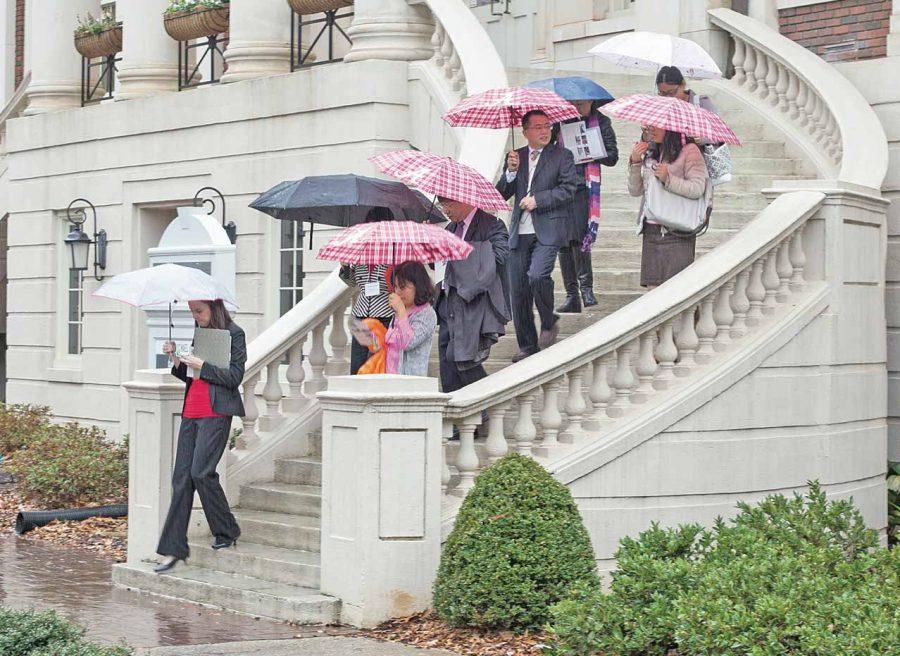A delegation of administrators and faculty from Shanghai Normal University Tianhua College in Shanghai, China, visited The University of Alabama on Monday, Jan. 13, as part of negotiations between Tianhua College and the UA College of Education to create an exchange program between the two institutions. The College of Education already has international programs in Latin America, but a deal with Tianhua would be the college’s first foray into Asia.
Peter Hlebowitsh, dean of the College of Education, said the first goal for the partnership is to establish a three-one program between Tianhua and The University of Alabama.
“We were contacted by one of the representatives at Tianhua College to have a discussion about the possibility of having what they’re calling a three-one cooperative program,” Hlebowitsh said. “Three-one meaning that they’d like to send students to our campus for their senior-year experience with the previous three-year experiences on their campus, with some of the coursework being taught by our faculty on their campus.”
Students studying primarily elementary education would study at Tianhua College in Shanghai for the first few years of their undergraduate career. Faculty from The University of Alabama would teach summer classes at Tianhua as part of the program. For their senior year, students in the program would come to The University of Alabama and complete a student teacher program at area elementary schools.
High-level administrators from Tianhua College including Weiping Shi, president of Tianhua College, visited The University of Alabama to get a better feel for the institution.
“I think for them, they just needed to physically see the place and to physically visit with some of the key people who are going to be involved with the project, to be sure that everything looks in pretty good order for their students,” Hlebowitsh said.
Lisa Gaskill, a doctoral student studying gifted education, was among the group leading the delegation on the tour. Rain kept most of the tour indoors.
“We’ve had to change our plans because of the weather, unfortunately,” Gaskill said. “But we took them to the business library, the business school, because one of the delegates is the dean at the business and management school. We will end up here in the education department, and we will also stop by one of the classes.”
Despite the inclement weather, Shi thought the visit was successful.
“We got a very good impression,” Shi said. “It’s great to be here and feel quite at home. They are well-organized programs, and the president of the University found time to meet us in her office. We just got very effective discussions with our colleagues here. This is a very good start.”
Another member of the delegation mentioned that people at the University had been very nice during their visit.
Representatives of both the College of Education and Tianhua College said they hope that any agreement would be mutually beneficial.
“For us, we realized there are some areas, like elementary educations, combined sciences, social sciences, social studies, these are common areas we developed very recently,” Shi said. “We lack experiences. Here, there’s rich experiences in these fields, so we can learn a lot.”
“They certainly have some things to teach us as well,” Hlebowitsh said. “But I think what they’re looking at is what is the sort of American tradition of teacher education and can they select pieces that will make sense or supplement the experiences of their students.”
Craig Shwery, director of international programs in the College of Education, said a partnership with Tianhua College would bring international recognition to The University of Alabama while providing research opportunities for faculty.
“We can become internationally known,” Shwery said. “Our program would become internationally known, and not just in South America … We benefit so much by this international teaching, that it truly helps us become more effective teachers.”
Although any agreement would likely start with the three-one program, Hlebowitsh and Shwery said they are hopeful that initiatives like this could grow over time and produce additional opportunities.
“We’re starting with something very modest here and hoping that the nature of it will produce more possibilities for cooperation and exchange and partnership,” Hlebowitsh said.
Many details still have to be worked out before an agreement is made, including which courses will be offered, who will teach the courses in Shanghai and how other logistical needs will be met.
“We’re still at the very tentative stages of discussion and agreement, but if we play our cards right I think that we’ll be able to have a good friendly partner, with whom we’ll be able to expand and do all sorts of interesting things in the future,” Hlebowitsh said.
Shi was also optimistic about the future.
“The prospect is so bright for both sides,” Shi said.









